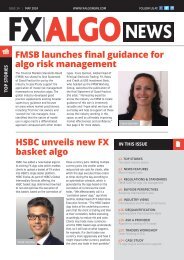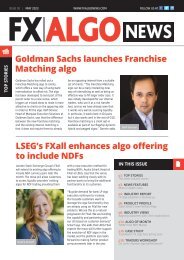Create successful ePaper yourself
Turn your PDF publications into a flip-book with our unique Google optimized e-Paper software.
Crossing the Security Rubicon:<br />
How Managed Service Providers<br />
are hastening banks’ migration<br />
to the Cloud<br />
NETWORKS, HOSTING & CONNECTIVITY<br />
The notion that ‘freedom lies on the other side of fear’ holds true not only in human<br />
psychology but also in the context of financial business. In the FinTech world, cloud technology<br />
is freeing banks and financial institutions into greater flexibility, resilience and, prudently<br />
done, profitability. To achieve this, they have to conquer fears about security and regulatory<br />
compliance.<br />
BARRIERS TO MIGRATION<br />
Not too long ago it was considered<br />
a highly risky proposition to store,<br />
manage and process sensitive<br />
financial and customer data in the<br />
cloud. In addition, the onus for<br />
compliance rested squarely on banks’<br />
shoulders. Relinquishing control of<br />
their environment while remaining<br />
responsible for their own security<br />
policies and procedures felt like too<br />
much of a risk.<br />
GROWING TRUST<br />
Nevertheless, to have any competitive<br />
relevance, banks and other financial<br />
Oscar Neill<br />
institutions must be able to innovate,<br />
streamline their operation, scale up<br />
or down, and ensure the highest<br />
levels of quality, performance, and<br />
customer service, all with the greatest<br />
agility and adaptability, and without<br />
compromising security.<br />
In recognition, specialist financial<br />
infrastructure providers are dedicated<br />
to facilitating not only operational<br />
efficiency but also secure and<br />
compliant governance up and down<br />
the supply chain.<br />
Oscar Neill, Chief Information and<br />
Security Officer for Beeks Group<br />
comments: “A dedicated financial<br />
services cloud provider understands<br />
the needs and pain-points of its<br />
client’s business as well as the controls,<br />
frameworks and compliance demands<br />
incumbent upon it. It keeps abreast<br />
of new regulations, forges securityfocused<br />
partnerships, and ensures its<br />
own security accreditations and quality<br />
standards are as current, auditable and<br />
dynamic as possible.”<br />
MSP OFFERINGS<br />
Consequently, the preparedness of<br />
Managed Service Providers (MSPs)<br />
to shoulder much of the compliance<br />
burden on behalf of their customers is<br />
beginning to influence the increasing<br />
level of comfort and trust among<br />
banks in cloud migrations.<br />
Here are a few key examples of how<br />
financial MSPs are doing this:<br />
Integrated pillars of security<br />
Describing how cloud security<br />
capabilities are key pillars of his<br />
company’s flexible architecture,<br />
Neill says: “Our capital markets<br />
dedicated private and hybrid<br />
Infrastructure as a Service (IaaS)<br />
solutions have integrated market<br />
leading malware protection and<br />
vulnerability scanning capabilities<br />
to ensure secure configurations<br />
for our customers’ infrastructure.<br />
Zero Trust access management,<br />
firewalling, intrusion detection<br />
and prevention, and Security<br />
Information and Event Management<br />
(SIEM) are all baked into our<br />
solutions from day one. Unlike<br />
public cloud infrastructure sharing,<br />
Beeks’ private cloud provision<br />
puts us in complete control of our<br />
66 NOVEMBER 20<strong>23</strong> e-FOREX
















